DS Automobiles DS 7 vs Porsche Taycan – Differences & prices compared
Compare performance, boot space, consumption and price in one view.
Find out now: which car is the better choice for you – DS Automobiles DS 7 or Porsche Taycan?
The DS Automobiles DS 7 (SUV) comes with a Diesel or Plugin Hybrid engine and Automatic transmission. In comparison, the Porsche Taycan (Coupe) features a Electric engine with Automatic transmission.
When it comes to boot capacity, the DS Automobiles DS 7 offers 555 L, while the Porsche Taycan provides 407 L – depending on how much space you need. If you’re looking for more power, decide whether the 360 HP of the DS Automobiles DS 7 or the 1034 HP of the Porsche Taycan suits your needs better.
In terms of consumption, the values are 1.30 L per 100 km for the DS Automobiles DS 7, and 16.70 kWh for the Porsche Taycan.
Price-wise, the DS Automobiles DS 7 starts at 41300 £, while the Porsche Taycan is available from 87900 £. Compare all the details and find out which model fits your lifestyle best!
DS Automobiles DS 7
The DS 7 stands out with its striking design and luxurious comfort, making it a true embodiment of French elegance in the SUV segment. Inside, the cabin showcases a blend of high-quality materials and innovative features that cater to both driver and passenger needs. With its impressive road presence and refined driving dynamics, the DS 7 promises a captivating driving experience that doesn't compromise on style.
details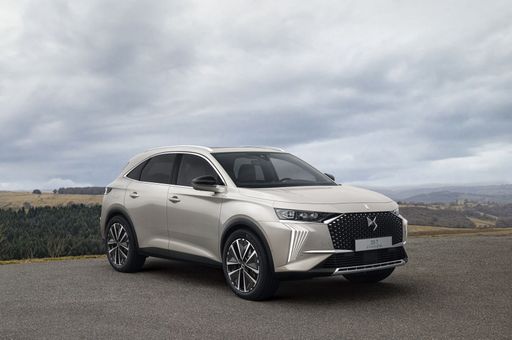 @ media.stellantis.com
@ media.stellantis.com
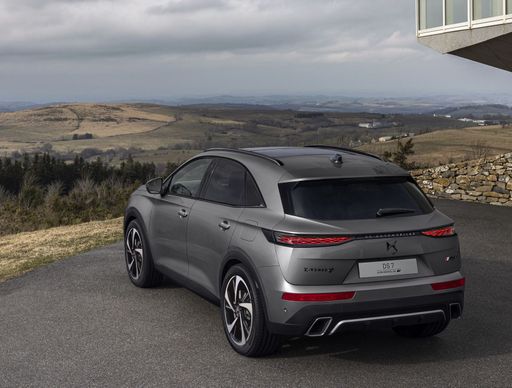 @ media.stellantis.com
@ media.stellantis.com
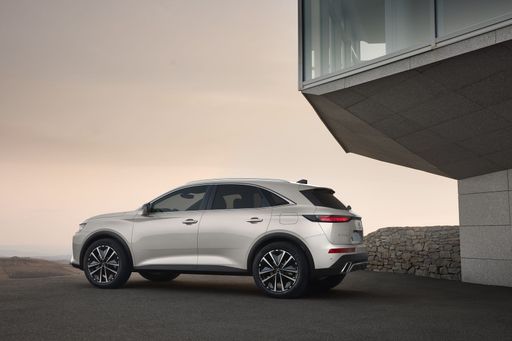 @ media.stellantis.com
@ media.stellantis.com
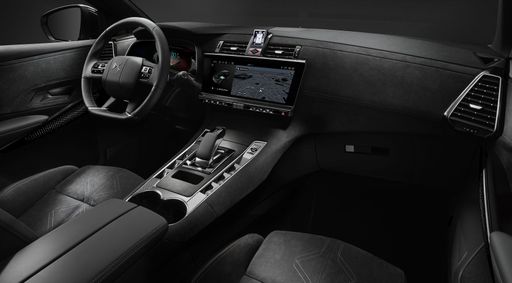 @ media.stellantis.com
@ media.stellantis.com
Porsche Taycan
The Porsche Taycan redefines the electric vehicle landscape with its stunning design and thrilling performance. With its smooth lines and athletic stance, this four-door sports car captures attention while delivering an exhilarating driving experience. Inside, the Taycan boasts a luxurious and high-tech interior, seamlessly blending comfort and cutting-edge innovation.
details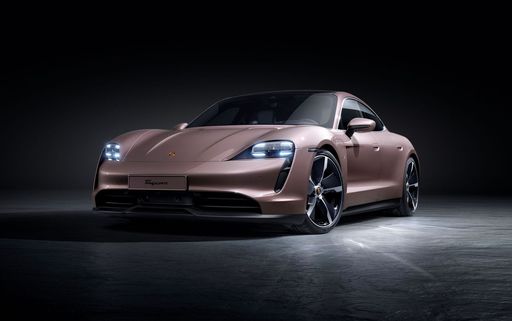 @ Porsche
@ Porsche
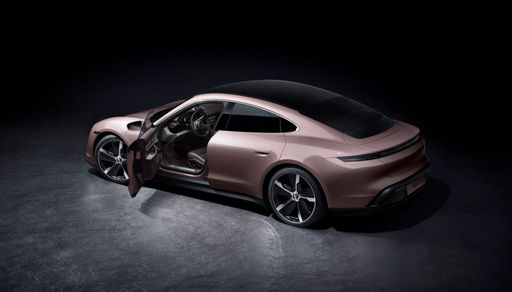 @ Porsche
@ Porsche
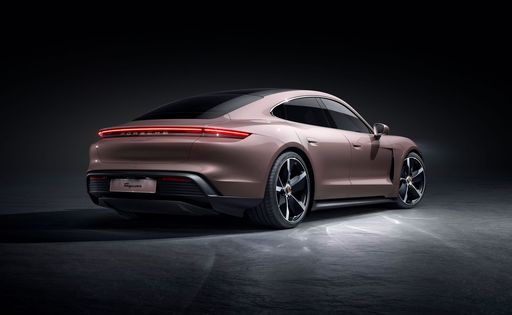 @ Porsche
@ Porsche
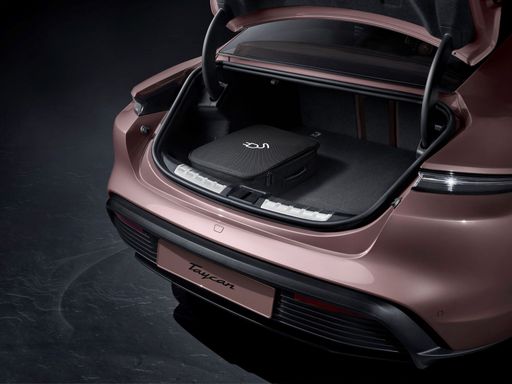 @ Porsche
@ Porsche
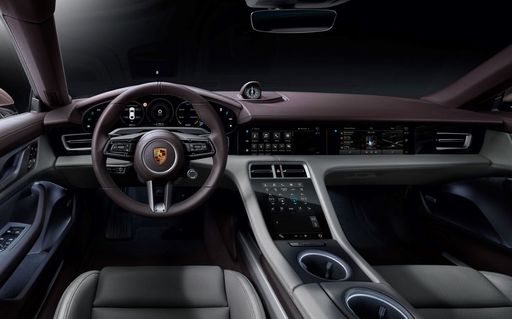 @ Porsche
@ Porsche

|

|
|
|
|
Costs and Consumption |
|
|---|---|
|
Price
41300 - 58500 £
|
Price
87900 - 206700 £
|
|
Consumption L/100km
1.3 - 5.5 L
|
Consumption L/100km
-
|
|
Consumption kWh/100km
-
|
Consumption kWh/100km
16.7 - 20.7 kWh
|
|
Electric Range
57 - 65 km
|
Electric Range
552 - 680 km
|
|
Battery Capacity
12.90 kWh
|
Battery Capacity
82.3 - 97 kWh
|
|
co2
30 - 145 g/km
|
co2
0 g/km
|
|
Fuel tank capacity
43 - 55 L
|
Fuel tank capacity
-
|
Dimensions and Body |
|
|---|---|
|
Body Type
SUV
|
Body Type
Coupe
|
|
Seats
5
|
Seats
4
|
|
Doors
5
|
Doors
4
|
|
Curb weight
1651 - 2002 kg
|
Curb weight
2165 - 2370 kg
|
|
Trunk capacity
555 L
|
Trunk capacity
326 - 407 L
|
|
Length
4593 mm
|
Length
4962 - 4968 mm
|
|
Width
1891 mm
|
Width
1966 - 1998 mm
|
|
Height
1625 mm
|
Height
1378 - 1381 mm
|
|
Payload
398 - 424 kg
|
Payload
175 - 635 kg
|
Engine and Performance |
|
|---|---|
|
Engine Type
Diesel, Plugin Hybrid
|
Engine Type
Electric
|
|
Transmission
Automatic
|
Transmission
Automatic
|
|
Transmission Detail
Automatic Gearbox
|
Transmission Detail
Reduction Gearbox
|
|
Drive Type
Front-Wheel Drive, All-Wheel Drive
|
Drive Type
Rear-Wheel Drive, All-Wheel Drive
|
|
Power HP
130 - 360 HP
|
Power HP
408 - 1034 HP
|
|
Acceleration 0-100km/h
5.7 - 11.9 s
|
Acceleration 0-100km/h
2.2 - 4.8 s
|
|
Max Speed
195 - 235 km/h
|
Max Speed
230 - 305 km/h
|
|
Torque
300 - 520 Nm
|
Torque
410 - 1340 Nm
|
|
Number of Cylinders
4
|
Number of Cylinders
-
|
|
Power kW
96 - 265 kW
|
Power kW
300 - 760 kW
|
|
Engine capacity
1499 - 1598 cm3
|
Engine capacity
-
|
General |
|
|---|---|
|
Model Year
2024 - 2025
|
Model Year
2024 - 2025
|
|
CO2 Efficiency Class
E, B
|
CO2 Efficiency Class
A
|
|
Brand
DS Automobiles
|
Brand
Porsche
|
DS Automobiles DS 7
The DS 7: A Luxurious SUV Experience
The DS 7 has firmly established its presence in the luxury SUV segment since its launch. Combining elegant design with cutting-edge technology, it stands out as a symbol of sophistication and performance. This SUV from DS Automobiles is designed to meet the demands of modern drivers seeking a compelling blend of luxury, comfort, and efficiency.
Elegance Meets Performance
The DS 7 is available in various powertrains, including efficient diesel and innovative plug-in hybrid systems. The lineup features the DS 7 BlueHDi 130 Diesel Automatic Front-Wheel Drive, offering a robust 130 HP and a remarkable fuel consumption of just 5.5 L/100 km. For those who crave electrification, the DS 7 E-Tense series includes a range of powerful hybrid options, such as the 225 HP variant, presenting an electric range of 65 km, making it a perfect choice for urban driving.
Advanced Hybrid Technology
Among the most impressive offerings is the DS 7 E-Tense 300 Plugin Hybrid Automatic All-Wheel Drive, which delivers a powerful 300 HP, while maintaining exceptional efficiency. This model can accelerate from 0 to 100 km/h in just 5.9 seconds, showcasing not only its sporty character but also its driveability. The integration of a 1.3 L engine and a battery capacity of 12.9 kWh ensures that it efficiently meets the needs of eco-conscious drivers without compromising on performance.
Luxurious Interior and Comfort Features
Stepping inside the DS 7 feels like entering a realm of pure luxury. The interior is finely crafted with high-quality materials and meticulous attention to detail, offering spacious seating for up to five passengers. The cabin is oriented towards providing a serene driving experience, with a trunk capacity of 555 liters, ensuring ample space for luggage. Moreover, the inclusion of state-of-the-art infotainment features enhances both driver and passenger connectivity.
Safety and Driver Assistance Innovations
Safety is a top priority for DS Automobiles, and the DS 7 reflects this commitment. It is equipped with an array of driver assistance systems, including adaptive cruise control, lane departure warning, and automatic emergency braking. These advanced technologies not only elevate the driving experience but also provide peace of mind, ensuring safer journeys on all roads.
Distinctive Trim Levels to Suit Every Taste
The DS 7 is available in various trims, including the exclusive Collection "Antoine de Saint Exupéry" and elegant Pallas variants. Each trim level is designed to cater to diverse preferences, offering unique styles and additional features to enhance the driving experience. From luxury finishes to high-tech enhancements, there’s a tailored DS 7 for everyone.
A Commitment to Sustainability
With an eye toward environmental responsibility, the DS 7 hybrid models boast impressive CO2 emissions figures, with the E-Tense variants emitting as low as 30 g/km. This commitment to sustainability, combined with high levels of performance, makes the DS 7 a forward-thinking choice in the luxury SUV market.
Conclusion: A Class Apart
In conclusion, the DS 7 encapsulates the essence of luxury and modern innovation in the SUV category. Its stunning design, advanced technologies, and array of powerful engines make it a noteworthy contender for anyone seeking an upscale driving experience. As drivers increasingly prioritize sustainability without sacrificing performance, the DS 7 firmly positions itself to meet these evolving demands.
Porsche Taycan
Unveiling the Porsche Taycan: A Leap into the Future
The Porsche Taycan has established itself as a pioneering force in the realm of electric vehicles, merging luxury with performance in a way few others can boast. With stunning aesthetics and groundbreaking technologies, the Taycan stands as a testament to Porsche's commitment to innovation in the automotive world.
Power and Performance: A New Era for Electric Driving
At the heart of the Taycan's allure lies its remarkable performance figures. The model is available in several configurations, with power ranging from 408 HP in the entry-level variant to an astonishing 1,034 HP in the Turbo GT edition. This kind of power translates directly into exhilarating acceleration, with the Taycan Turbo GT achieving 0-100 km/h in just 2.2 seconds. Even the more modestly powered variants offer thrilling performance while managing to retain daily usability.
The Taycan's drive system includes options for both rear-wheel drive and all-wheel drive, providing flexibility based on driver preference. This versatile drivetrain couples impeccably with Porsche's advanced electric motors, ensuring optimal performance under various conditions.
Battery Technology and Range: Where Engineering Meets Efficiency
The Taycan ships with sophisticated battery technology that caters to both performance and practicality, with capacities ranging from 82.3 kWh to 97 kWh. The Performance Battery Plus variant extends the electric range to an impressive 680 km, while even the more potent Turbo and Turbo S models manage to offer about 634 km of range, ensuring that drivers can enjoy spirited drives without the constant worry of recharging.
Moreover, the efficiency of the Taycan is notable, with consumption figures around 16.7 to 20.6 kWh per 100 km. This blend of efficiency and power redefines how one perceives electric mobility.
Charging Innovations: Powering Up Fast
Charging innovations further enhance the Taycan’s appeal. With a maximum charging capacity of 270 kW, the Taycan can achieve an 80% charge in just about 22.5 minutes under optimal conditions. This means less time tethered to a charging station and more time enjoying the open road.
Cutting-edge Technology: A Driver’s Digital Playground
Inside, the Taycan is equipped with cutting-edge technology that ensures both driver engagement and comfort. The dual-screen cockpit integrates a 10.9-inch infotainment display alongside a 10.9-inch passenger display, offering intuitive access to navigation, entertainment, and vehicle settings.
Porsche’s innovative approach extends to advanced driver assistance systems, enhancing safety while maintaining the driving experience characteristic of the brand. Features like adaptive cruise control, lane-keeping assistant, and parking aids seamlessly integrate to assist drivers without compromising the thrill of driving a Porsche.
Design That Turns Heads
The Porsche Taycan is not just about performance and technology; it is also a design statement. With sleek lines, aggressive stance, and the signature Porsche front fascia, the Taycan conveys an unmistakable aura of luxury and sportiness. The aerodynamic profile plays an essential role in its efficiency and performance, showcasing Porsche's devotion to their design ethos.
Conclusion: The Porsche Taycan's Legacy
In conclusion, the Porsche Taycan represents a significant leap forward for electric vehicles, successfully combining performance, range, and technology with the spirit of Porsche. As the automotive industry pivots increasingly towards electrification, the Taycan sets a high bar, promising to deliver excitement, efficiency, and the unmistakable joy of driving. With each model released, Porsche underscores its commitment to redefining performance vehicles for a new generation, making the Taycan not just a car, but a symbol of innovation and luxury in the electric age.
The prices and data displayed are estimates based on German list prices and may vary by country. This information is not legally binding.
